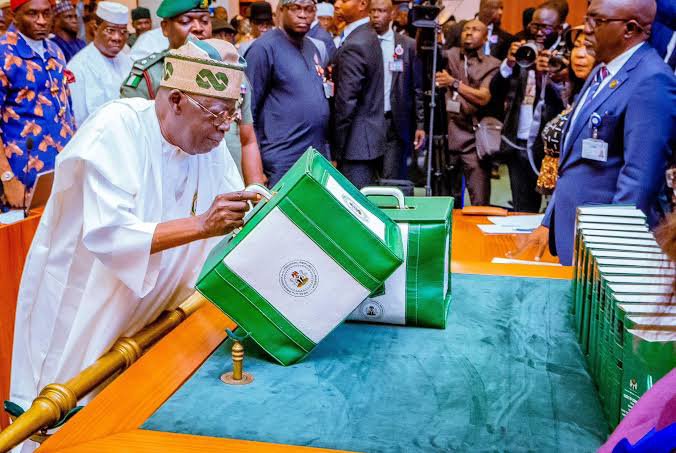By Augustine Omilo | Analyst |
Two recorded leadership issues were brought to the notice of Nigerians recently. While one seemed to mark the end of 2023, the other represented the beginning of 2024. And both of them emanated from the president of Nigeria, Bola Ahmed Tinubu. On the 8th day of November, 2023, e signed into law, the 2023 supplementary appropriation bill and signed the national budget for 2024 into law on the 1st of January, 2024.
In terms of thoroughness, it appears that what the national assembly of Nigeria passed into law in December 2023 as appropriation bill was merely the budget speech of Mr. President plus the suspicious N1. 2trn addition to it by the law makers.
The financial projections as prepared by the executive arm of government and presented to the National Assembly showed the willingness of government to spend N27.5 trillion for the entire year. This was accompanied with estimated revenue of about N18.32 trillion for the same period. With the intention of Tinubu, the nation was to battle with a budget deficit of about N9 trillion in 2024.
However, the budget was returned to the president for his ascent into law by the legislators after adding N1.2 trn, thus bringing the expected expenditure for the year to N28.7trn. In justifying the increase, the president of the senate, Godswill Akpabio sighted the need for improved welfare of citizens and the execution of more capital projects during the year. But surprisingly, the chairman of the senate committee on abppropriation, Senator Solomon Olamilekan Adeola maintained the view that the increase arose because of the need to meet the request for additional funding arising from the list of items that were not captured by the president in his proposed bill.
On his part, the chairman of house of representatives committee on appropriation, Abubakar Bichi blamed the increase on the continued rise in inflation and the downward slide in the value of the nation’s currency, the naira.

The shared views on the increase of the budget by the law makers notwithstanding, they failed to recognize the need for a corresponding necessity to offer solutions regarding the funding of the extra budgetary allocation in terms of revenue generation. This would have served the purpose of reducing the gap between income and expenditure for the period.
Meanwhile, at both the presentation of the appropriation bill to the National Assembly and its return for ascent by Mr. president, no attempts were made to intimate the people of Nigeria on the performance of the budget for 2023.
Though, worthy of note is the fact that the president captured most of the essential aspects of the nation’s critical areas of urgent attention like insecurity and education, the explicitly of the entire document leaves much to be desired. In the process of signing the budget into law, there was no explanations to support the allowing of the 2023 supplementary budget of over N2 trillion to run concurrently with the appropriation act of 2024.
Some of the reasons given by BAT for proposing extra budget for 2023 included the urgent need to tackle insecurity, payment of wage awards to the Federal civil servants, urgent rehabilitation of poor federal roads, cash transfer to 1.5m vulnerable households amongst others. But curiously, the government has only paid wage award for September as at 31st December, 2023 . The federal capital territory and the ministry of works have just received 50% of what was proposed for them in the additional budget of last year. With the supplementary budget running pari passu with the current national budget, can Nigerians feel safe to conclude that the country is running two budgets for the same new year? If the answer is yes, can the budget deficit for 2024 still remain about N9 trillion, especially given the fact that the national assembly equally added about N1.2 trillion to the original plan of Tinubu? And finally, where is the financing of these additional expenditures going to come from?
From the significant roles played by national budget in ensuring transparency in governance, the executive and legislative arms of government at all levels owe the citizens a duty to present explainable budget proposals. It is only through this means that the yearly fiscal policy thrusts can be used properly to monitor and control the activities of government during a given period.
Going forward, accounting, banking and finance experts as well as other professionals must of necessity help others to understand the financial plans of governments. Additionally, it will not be out of place for governments to commercially serialize the publication of budget details in national newspapers and magazines.